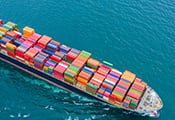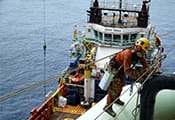What is Cargo Insurance?
Cargo insurance, also known as freight insurance, provides coverage to goods (cargo/ freight) in transit against loss or damage. Usually unforeseen, this loss or damage can be caused while the goods are in transit, whether by sea, land, or air. As 90% of the total international cargo transportation is conducted by sea route, marine insurance for cargo also known as cargo insurance is very important in international trade.
Parameters Involved to Determine the Marine Insurance Premium
Cargo insurance rates or the premium amount are usually determined by the insurer based on risk estimates shared by the insured. Below are some parameters taken into consideration while calculating marine insurance premium:
Value and Nature of the Goods
Different types of goods, like consumer goods, heavy industrial materials, raw materials, etc., are in transit daily. The value and nature of the goods play an essential role in determining the premium amount.
For instance, goods having high value would have a higher premium. Likewise, perishable goods or goods that are fragile also carry high premium amounts. The main reason is that recovery of such damaged goods is very difficult.
Construction and Type of Vessel
The construction quality, age, adaptability, and fitness of the vessel, play a crucial role in defining the premium for marine insurance for cargo. The risk of cargo getting damaged is higher if the goods are placed in an older and not well-maintained vessel.
Natural Calamities
Natural calamities or disasters like hurricanes, floods, earthquakes, tsunamis, cyclones etc., can have a huge impact on the goods in transit and damage them. Forecasting the intensity of these perils is not always possible, which may lead to huge financial losses. Some parts of the world are highly prone to natural calamities, thus, transporting goods to those parts may attract a high premium.
Terms and conditions of the policy
Understanding the terms and conditions of any policy is very important before making a purchase decision. The inclusions and exclusions in the policy should be read carefully. Usually, policies that cover total losses have a higher premium vis-à-vis those that cover partial losses.
Loss history
Insurance companies attach questionnaires regarding previous losses to understand the riskiness of the business. If the insured has a history of frequent claims, chances are he will be charged a higher premium. However, the shipper is sometimes expected to prove that adequate measures were taken to avoid losses. Also, he might have to ensure that similar claims would not occur again.
Risk management strategy
Continuing the above point, if the shipper proves that specific risk management techniques are undertaken the insurance company may offer cargo insurance at a lower premium. A few of the risk management techniques include proper packaging, disaster management programs, special programs for theft prevention, etc.
Conclusion
If you are in the business of import-export, you might know how essential is marine insurance for cargo. Premium calculation for marine cargo insurance isn’t difficult, but it is vital to get the right valuation on the goods to be insured.






















 Expert advice made easy
Expert advice made easy


